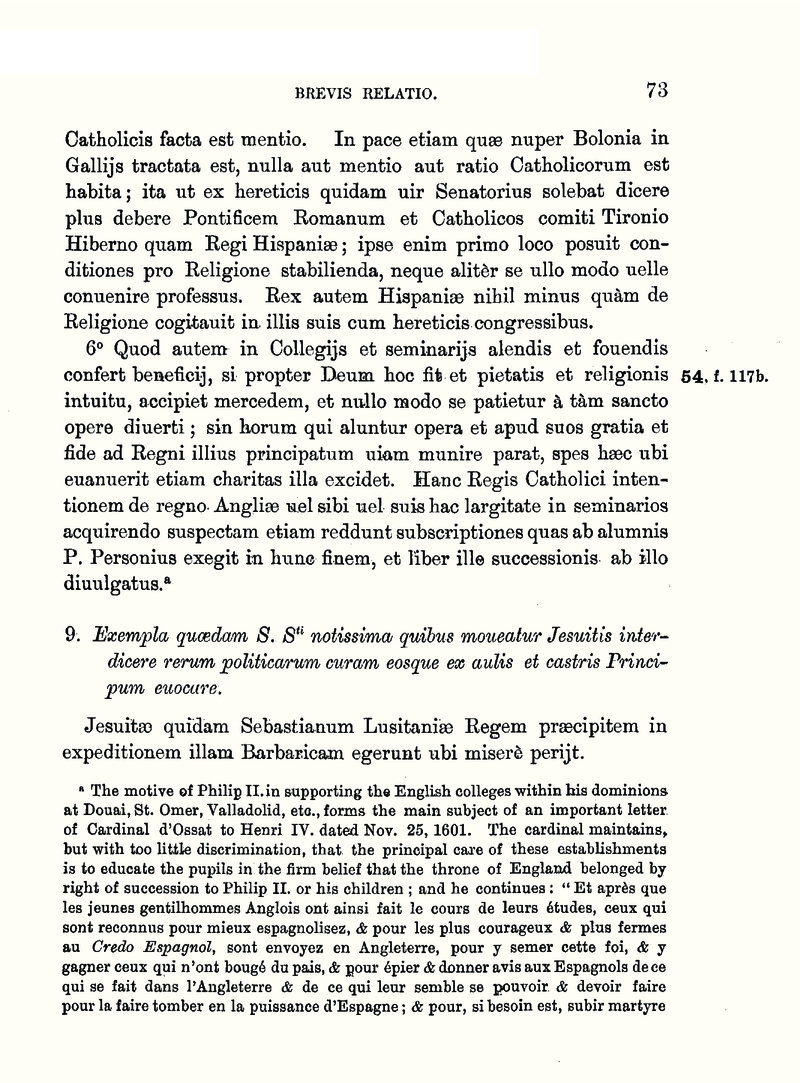No CrossRef data available.
Published online by Cambridge University Press: 24 December 2009

Page 73 note a The motive of Philip II. in supporting the English colleges within his dominions at Douai, St. Omer, Valladolid, etc., forms the main subject of an important letter of Cardinal d'Ossat to Henri IV. dated Nov. 25, 1601. The cardinal maintains, but with too little discrimination, that, the principal care of these establishments is to educate the pupils in the firm belief that the throne of England belonged by right of succession to Philip II. or his children; and he continues : “Et après que les jeunes gentilhommes Anglois ont ainsi fait le cours de leurs études, ceux qui sont reconnus pour mieux espagnolisez, & pour les plus courageux & plus fermes au Credo Espagnol, sont envoyez en Angleterre, pour y semer cette foi, & y gagner ceux qui n'ont bougé du pais, & pour épier & donner avis aux Espagnols de ce qui se fait dans l'Angleterre & de ce qui leur senible se pouvoir & devoir faire pour la faire tomber en la puissance d'Espagne; & pour, si besoin est, subir martyre aussibien ou mieux pour la dite Foi Espagnole, que pour laEeligion Catholique.“ If this could be the deliberate belief of a churchman and statesman of d'Ossat's character and sagacity, is it surprising that Elizabeth and her counsellors held the same belief and acted upon it ?
Page 74 note a Odo Pigenat, provincial of the Jesuits and member of the Council of the “Sixteen” who held their meetings commonly in the Jesuit college at Paris. Father Commolet was another prominent supporter of the League. For the opinions of the Appellants on these affairs, see the Preface “To all English Catholicks that are faithfull subjects to Queene Elizabeth our most dread Soueraigne” prefixed by “The Secular Priests” to their translation of the Jesuits Catechism, 1602.
Page 74 note b See “The Spanish Blanks and Catholic Earls 1592–4” in the Scottish Beview, July 1893. Father Creighton's apparent change of front was the subject of Cecil's rare tract “A Discoverye of the errors committed and injuryes don to his MA. off Scotlande and Nobilitye off the same realm and John Cecyll pryest and D. of diuinitye by a malitious Mythologie titled an Apologie and compiled by William Criton Pryest and professed Jesuite, whose habit and behavioure whose cote and conditions are as sutable, as Esau his handes, and Jacob his voice,” dated Montmartre, Aug. 10, 1599.
Page 75 note a This is a common mistake. Father Gordon made no false pretences to the pope. His receipt to the papal treasury, signed by him Aug. 9, 1594, is printed in Bellesheim's History of the Cath. Ch. in Scotland (Hunter Blair's transl., iii. p. 449) and bears plainly on the face of it that the money was paid by Mgr. Gio. Sapiretti, the deputy paymaster of the Camera Apostolica in Scotland to the Earls of Huntly, Angus, and Errol to enlist soldiers in defence of good Catholic Scots against the heretics.
Page 75 note b On the death of the fourth Earl of Derby, in 1592, Richard Hesketh, a Catholic gentleman, was commissioned by Sir William Stanley and Father Holt to negotiate with the Earl's son and successor Lord Strange regarding the succession to the crown. Lord Derby delivered Hesketh to the Council and he was executed for high treason, Nov. 29, 1593. Gillow, Bibl. Dict.
Page 75 note c Joseph Cresswell, sometime rector of the English College at Rome and subsequently superior of the English missionaries in Spain, died 1623. Charles Tancred was in 1592 minister at the Seminary of Seville. He died at Valladolid, July 1599 (Oliver).